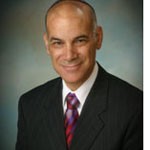By Rabbi Leonard Rosenthal

SAN DIEGO — Did you know that despite the commonly held view that the Torah is perfect, it contains mistakes and questionable readings? At a certain point in time (between the 7th and 10th centuries) a scholarly group known as the “Masoretes” decided on a definitive text, choosing from the different Torah scrolls that were extant at the time.
Since the Masoretes did not want to change a received text, they chose one they thought the most accurate, but did not change or correct it. Rather, they made notes that clue the reader that there is a textual issue.
Sometimes the markings are in the Torah scroll itself. One such example occurs in parashat Nitzavim. If you look at the Torah in the Book of Deuteronomy, you will see that there are marks over the last words of verse 29:28 (illustration below).
Here is the translation of the entire verse with the words in question underlined: “Concealed acts concern the Lord our God; but with the overt acts, it is for us and our children ever to apply all the provisions of this Teaching.”
What is the problem the Masoretes found? They didn’t tell us! There are various midrashim (rabbinic explanations) that tease out the meaning.
When I was in school I was taught that it is problematic to say that God sees the concealed things and we see the overt, because God sees everything. Perhaps, it was suggested, the verse should have read: “The concealed and overt things belong to God” and the words “for us and our children” should not have been there. In truth, we will never know the Masoretes’ reasoning.
Rabbi Mendel of Kotzk, however, had his own explanation of the verse. He played with the words “concealed” and “overt.” He said: “I prefer the Chassid who sins in public and performs mitzvot in private, to the Chassid who performs his mitzvot in public and sins in private!”
He also said that the popular definition of a “hidden tzaddik (righteous person) is one who hides his righteousness and good deeds from public view. However, said Rabbi Mendel, the true definition of a “hidden tzaddik” is one who hides his righteousness from themself – the one who does good deeds but never thinks of themself as righteous.
During the upcoming High Holy Days let us aspire to such righteousness and humility.
*
Rabbi Rosenthal is spiritual leader of Tifereth Israel Synagogue in San Diego. You may comment to leonard.rosenthal@sdjewishworld.com
